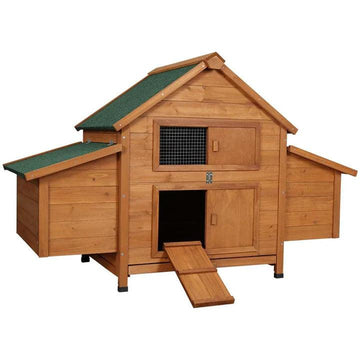Introduction
So, you’ve decided to raise chickens in your backyard. That’s clucking awesome! But before you start, you need a safe and comfortable home for your feathery friends a chicken coop. This article will guide you through the process of building a chicken coop from scratch. Let’s get cracking!
Why Raise Chickens?
Fresh Eggs
One of the biggest perks of raising chickens is having a constant supply of fresh eggs. Not only are they delicious, but they’re also more nutritious than store-bought ones.
Natural Pest Control
Chickens love to peck at insects. They can help keep your garden free of pests without the need for harmful pesticides.
Sustainability
Raising chickens is a step towards a more sustainable lifestyle. They can eat your kitchen scraps, and their droppings can be used as fertilizer.
Planning Your Chicken Coop
Location
Choose a spot that’s dry and not directly exposed to strong winds. Make sure the chicken coop with run is also easily accessible for cleaning and collecting eggs.
Size and Capacity
How big should your coop be? Well, that depends on how many chickens you plan to keep. Generally, each chicken needs about 2-3 square feet of space.
Local Regulations
Check local regulations regarding keeping chickens. Some areas may have restrictions on the number of chickens you can keep or where you can place your coop.
Essential Features of a Chicken Coop
Ventilation
Good airflow is crucial. It helps to keep the coop dry and prevents respiratory diseases among chickens.
Nesting Boxes
This is where your chickens will lay their eggs. There should be at least one box for every three hens.
Roosting Bars
Chickens sleep on roosting bars. They should be placed higher than the nesting boxes.
Protection from Predators
Ensure that your large chicken coop is secure from predators like foxes and raccoons. Use sturdy materials and consider installing locks or latches.
Building Materials and Tools
You’ll need wood for framing, chicken wire, nails, screws, a hammer, asaw, and other basic tools. Don’t forget paint or stain to protect the wood.
Step-by-Step Guide to Building a Chicken Coop
Laying the Foundation
Start by leveling the ground where your coop will stand. Lay down a layer of gravel for drainage, followed by concrete blocks or wooden planks as a foundation.
Constructing the Frame
Using wood, build the frame of your coop. Make sure it’s sturdy. This is the skeleton of your coop, so it needs to be strong.
Adding the Roof and Walls
Attach plywood to the frame for walls. For the roof, you can use shingles or metal roofing. Make sure it’s waterproof!
Installing Nesting Boxes and Roosting Bars
Inside the coop, install chicken nesting box for the chickens to lay eggs. Add roosting bars higher than the nesting boxes.
Maintenance and Cleaning
Regularly clean the coop to prevent diseases. Replace bedding, clean the nesting boxes, and make sure there’s always fresh water available.
Conclusion
Building a walk in chicken coop can be a rewarding experience. It not only provides a home for your chickens but also contributes to a sustainable lifestyle. Remember to plan ahead, use sturdy materials, and regularly maintain the coop. Now, get ready to enjoy fresh eggs and the delightful company of your feathery friends!
FAQs
-
How many chickens can I keep in my coop?
- Generally, each chicken requires about 2-3 square feet of space inside the coop.
-
What should I use for bedding in my chicken coop?
- Straw, hay, or wood shavings are commonly used as bedding materials.
-
How often should I clean the chicken coop?
- It’s best to clean the coop at least once a week to maintain hygiene.
-
Can I use an old shed as a chicken coop?
- Yes, an old shed can be repurposed into a chicken coop with some modifications.
-
Do chickens need a light in their coop?
- Chickens do not necessarily need a light at night, but a light can be used to encourage egg-laying during winter months.





